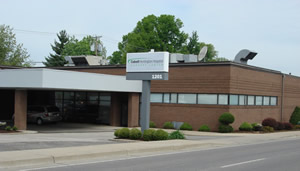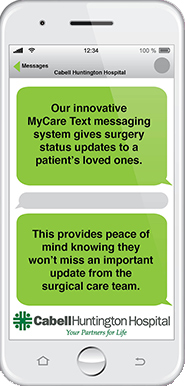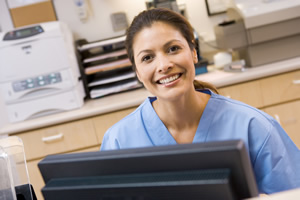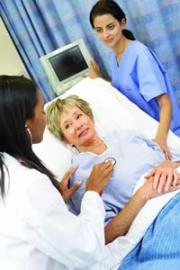Surgery
From routine operations to delicate neurosurgery to complex trauma care, Cabell Huntington Hospital's Surgery Department is prepared for nearly any procedure. In addition to general surgery, the hospital offers specialties such as neurosurgery, urology, orthopedics and surgical oncology, as well as gynecologic, oral, maxillofacial, thoracic, bariatric and cosmetic surgeries. Through Cabell Huntington's partnership with Marshall Surgery, the da Vinci Surgical System, other advanced technology and leading-edge techniques are incorporated into each patient's care as appropriate.
Where is Your Surgery Scheduled?
 When you are scheduled for surgery, it may take place in one of two facilities, and each facility follows its own process for registering and preparing for surgery. To learn more about what to expect, be sure to review the specific information that applies to the facility where you will have surgery.
When you are scheduled for surgery, it may take place in one of two facilities, and each facility follows its own process for registering and preparing for surgery. To learn more about what to expect, be sure to review the specific information that applies to the facility where you will have surgery.
The Cabell Huntington Hospital Surgery Center is a separate facility across the street from the hospital, with separate instructions about how to prepare and what to expect from surgery.
Cabell Huntington Hospital's Surgery Department is located on the second floor of the hospital, and you can use the elevator in the Lobby to get there. To learn more about how to prepare and what to expect, please watch the video on this page and read the instructions below.
Preparing for Surgery at CHH— Let's Get Started!
At Cabell Huntington Hospital, our goal is to ensure that your surgical experience is as comfortable and stress-free as possible— and you are an important part of the process! By reviewing the information in your surgery guide, you will know what to expect when you arrive at the hospital for your procedure. It may be helpful for your loved ones review the surgery guide, so they will have a better understanding of the process.
Pre-Anesthesia Admission and Testing
The purpose of Pre-Anesthesia Assessment and Testing (PAT) is to ensure that the anesthesia team has your current medical information, which will help keep you safe and comfortable during your procedure. Please allow about an hour for your PAT visit.
The PAT nurses will review your health history and complete any testing, such as lab work and an EKG, based on your medical history. Be sure to bring all your medications, including prescriptions, over-the-counter medicine, vitamins and supplements, with you in a resealable bag. The PAT staff will provide instructions about your medications, pre-operative preparation and where to report on the day of surgery.

Receive text updates during surgery.
The Evening Before & the Morning of Your Surgery
Diet: Follow all dietary instructions provided by your PAT Nurse.
Medication: Your PAT nurse explained about whether to take your prescriptions before surgery. Please refer to your PAT check sheet for instructions.
Grooming: Do not wear any perfume, makeup, deodorant, lotion or baby powder to the hospital. Also, do not shave the area that will be operated on. Doing so can increase your chance of developing a surgical site infection. Feel free to brush your teeth, but remember not to swallow any water in the process. Be sure to wear comfortable shoes and loose, casual clothing.
Your Belongings
Be sure to bring
- Your photo identification or driver's license
- Medicare and/or insurance card and co-payment for registration
- Any paperwork your doctor has given you, like permits and lab orders
- Your living will and advanced directives
- Your medications
- Your eyeglasses, contact lenses, hearing aids or dentures, with storage case
Please leave these at home
- jewelry
- credit cards
- valuables
- wallet/purse
- car keys
If you brought these items with you, please give them to a family member or friend to keep them safe.
The Day of Surgery
Pre-Op
 Please report to the Outpatient Surgery Reception Desk on the second floor, where you and your family will be given a pager. The first page you receive means that it's time for you to go to Pre-Op to prepare for surgery, while your family remains in the waiting room with the pager. Your family will be paged to join you in the Pre-Op area until it is time for you to be taken to the operating room. Due to space constraints, please limit visitors to two family members at a time. You may rotate family members as you wish. For your safety, members of the Pre-Op surgical team may perform tests, check your medical history and take vital signs such as blood pressure and temperature.
Please report to the Outpatient Surgery Reception Desk on the second floor, where you and your family will be given a pager. The first page you receive means that it's time for you to go to Pre-Op to prepare for surgery, while your family remains in the waiting room with the pager. Your family will be paged to join you in the Pre-Op area until it is time for you to be taken to the operating room. Due to space constraints, please limit visitors to two family members at a time. You may rotate family members as you wish. For your safety, members of the Pre-Op surgical team may perform tests, check your medical history and take vital signs such as blood pressure and temperature.
Surgery
Once it's time for your surgery, your family will return to the waiting area, where they will be updated each hour. This might be a good time for them to stop by the cafeteria or Perk Place for a bite to eat, or call family members to update them on your progress. Your family can also check the surgery update monitor in the waiting area to track your progress from the operating room to Recovery and into the Post-Anesthesia Care Unit (PACU), where visitors are allowed.
Recovery
 After your surgery is completed, you will stay in the operating room until your condition indicates you are ready to move to the Recovery Area. The Recovery nursing team will monitor your vital signs, surgical site, pain, level of alertness and comfort. It’s normal to have some pain and discomfort after surgery, and your nurse will monitor and treat your pain as prescribed by your surgeon. We know that your loved ones want to see you as soon as possible, but your safety and well-being are our first priority. Some patients may still be sleepy or possibly experience some nausea in the PACU, but we will do our best to accommodate brief visits. Your patience is greatly appreciated.
After your surgery is completed, you will stay in the operating room until your condition indicates you are ready to move to the Recovery Area. The Recovery nursing team will monitor your vital signs, surgical site, pain, level of alertness and comfort. It’s normal to have some pain and discomfort after surgery, and your nurse will monitor and treat your pain as prescribed by your surgeon. We know that your loved ones want to see you as soon as possible, but your safety and well-being are our first priority. Some patients may still be sleepy or possibly experience some nausea in the PACU, but we will do our best to accommodate brief visits. Your patience is greatly appreciated.
Outpatient Surgery Discharge
An outpatient procedure means that you will go home the same day as your surgery. You must have family or a friend drive you home. It is important that you and your family/friends pay close attention to the home care instructions that will be reviewed with you before you are discharged.
Inpatient Surgery
Some procedures may require you to be admitted to the hospital after surgery, usually because your recovery requires more nursing care. When you are stable, your care team will transport you to a nursing unit as a bed becomes available. Each nursing unit has highly trained staff and physicians who focus on the healing and recovery of our patients.
Pain Management: Our goal is to treat your pain so that you will be as comfortable as possible and so that pain does not interfere with your recovery or impact your quality of life.
Preventing Falls: Because you will be weak after surgery, it's important to protect yourself from falls by:
- Asking for help getting out of your bed or chair and when you need to use the restroom
- Sitting up for a few moments before standing, to be sure you are not light-headed or dizzy
- ALWAYS wearing slippers with non-slip rubber soles
- Not using furniture, doorknobs, bed-rails or other items for support
Infection Control: Clean hands are the single most effective way to prevent the spread of infections. Be sure to use antimicrobial soap when washing your hands. To ensure your hands are thoroughly clean, scrub them while humming or singing Happy Birthday to You two times. Don’t be afraid to tell your visitors, nurses and doctors to wash their hands before touching you. Ask your nurse for instructions on how to care for your surgical wound at home.
Follow Up Appointments: During discharge, your caregivers will let you know about your follow-up appointments that are scheduled or need to be scheduled with your physician. Be sure to attend these appointments so that your physician can check your progress and how well you are healing.
If you have any questions after discharge, please call the number listed on your discharge instructions.
